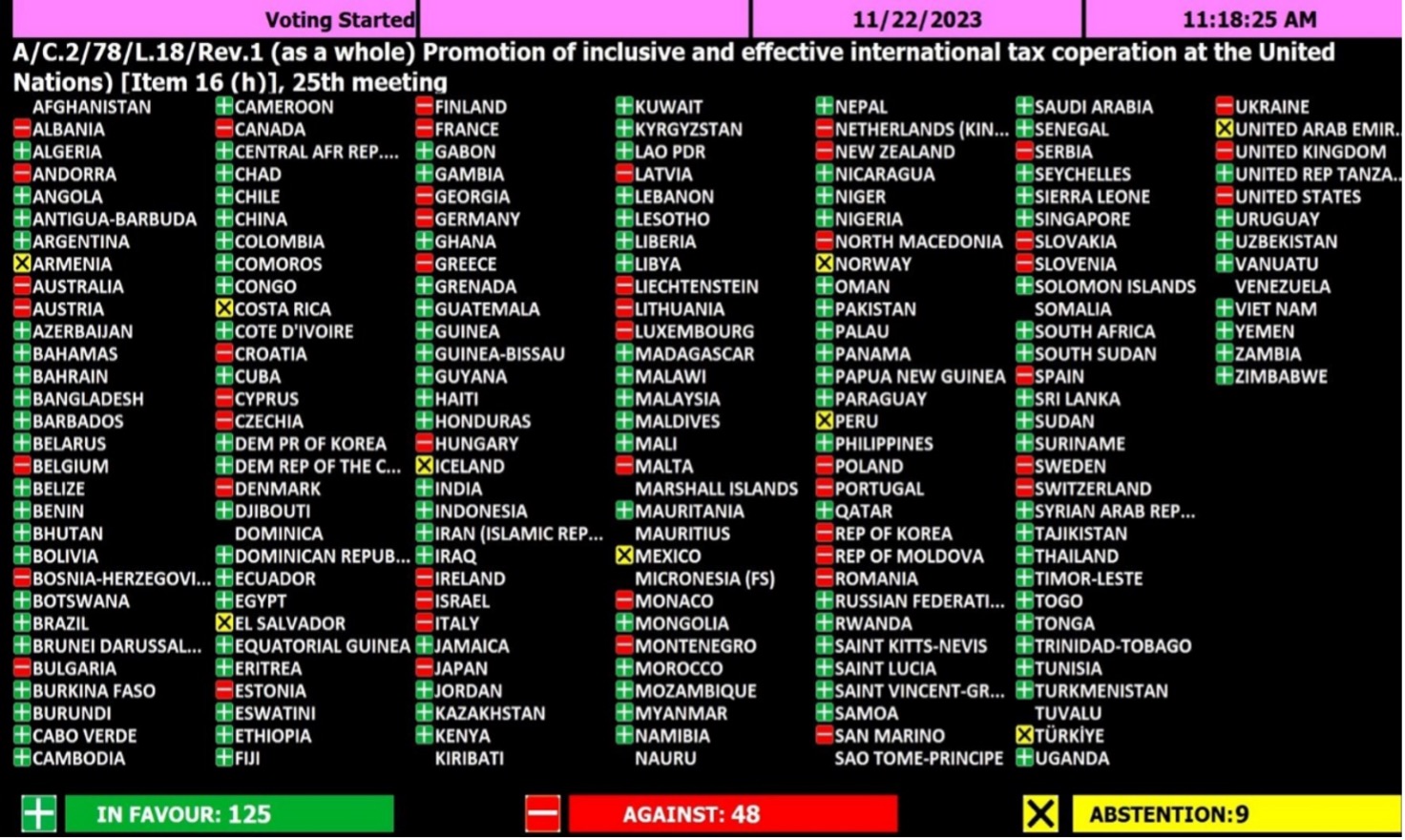A new global fiscal leadership?
- blog de bacosta
- 1474 lecturas
The OECD, composed chiefly of countries from the Global North and some Latin American countries, set out to lead global tax reform in 2013. Ten years later, corporate influence and inequity in decision-making between countries have left a poor outcome. Because of this dissatisfaction, in 2023, a group of African countries led by Nigeria proposed negotiating a convention on international taxation at the UN with the backing of much of the G77.[1] The resolution, passed with 125 votes in favour, 48 against and nine abstentions, seeks to change the international taxation approach and directly addresses north-south tensions. The UN negotiations will likely lead to new institutional leadership, potentially a victory for the countries of the Global South.
The OECD - a group of 38 countries - has dominated international tax policy discussions for decades. Since 2013, the formal structure for global tax policymaking at the OECD expanded the form of its decision-making to a broad group of 137 countries through the so-called "Inclusive Framework". The official documentation then emphasized that all countries would participate on an "equal footing". This framework facilitated the development of the well-known "two-pillar approach" analyzed in previous notes, pushing for global tax reform. A decade after its launch, the ambitious initial proposal has been profoundly watered down, not only because of the ability of corporate power to intervene in decision-making but also because of the unwillingness of this "inclusive framework" to truly incorporate the interests of the southern countries as a whole.
Disappointed by this process, several African countries led by Nigeria launched an initiative in 2023 to move the issue of international tax treaties to the United Nations. The proposal quickly gained the substantive support of the G77 coalition of developing countries. On 22 November 2023, the final resolution to implement this was voted on at the UN, with 125 votes in favour, 48 against, and nine abstentions.
 The United States, the United Kingdom, Canada and all EU member states voted against the resolution. Most Latin American countries, including Chile and Colombia, both OECD members, voted in favour. On the other hand, Mexico, Costa Rica, El Salvador and Peru abstained.
The United States, the United Kingdom, Canada and all EU member states voted against the resolution. Most Latin American countries, including Chile and Colombia, both OECD members, voted in favour. On the other hand, Mexico, Costa Rica, El Salvador and Peru abstained.
Regarding North-South interests, one of the central disagreements with the OECD model reported by African countries is between capital-exporting and capital-importing countries. For a long time, international tax treaties sought to restrict the taxation of profits in host countries to attract foreign investment. Thus, countries where foreign companies generated profits could not tax profits, which were reserved only for the countries of origin. It seemed reasonable among OECD countries, generally home and host countries for multinational companies, but not for the rest.
The rise of digital commerce has made this model even more unsustainable, increasingly reducing the tax entitlements of low- and middle-income countries. Host countries of multinationals receive a much smaller share of taxes than the profits they generate on their territory. A scheme that incentivizes these companies to minimize their tax burden by taking advantage of differences in tax burdens and rules between countries. But it also harms both tax revenues and the overall economy of host countries by discouraging foreign companies from creating local jobs and giving them tax advantages over local competitors.
The proposal now being discussed by the new UN committee wants to allow host countries to tax business services, especially digital ones, even if the business has a small physical presence in the country. The host countries would achieve this by introducing a withholding tax on payments for cross-border services. The idea is that effective and fair taxation of multinational companies is based on the economic reality that they operate as unitary entities. Factors that reflect their actual economic activities in each country should serve to allocate the right to tax global profits. Another relevant point of the approved resolution is the need for tax cooperation based not only on voluntary guidelines - the line that the OECD seemed to follow - but on legally binding multilateral agreements, which can go beyond bilateral agreements between countries.
The aim of the current negotiations on the proposals at the UN is to generate a new institutional framework that can subordinate the agreements already reached in the OECD but with the capacity to avoid the blockages encountered. It would undoubtedly be a massive victory for the countries of the Global South.
[1] Although there were 77 founding members of the Geneva-based organization in 1964, it has since expanded to 135 member countries.